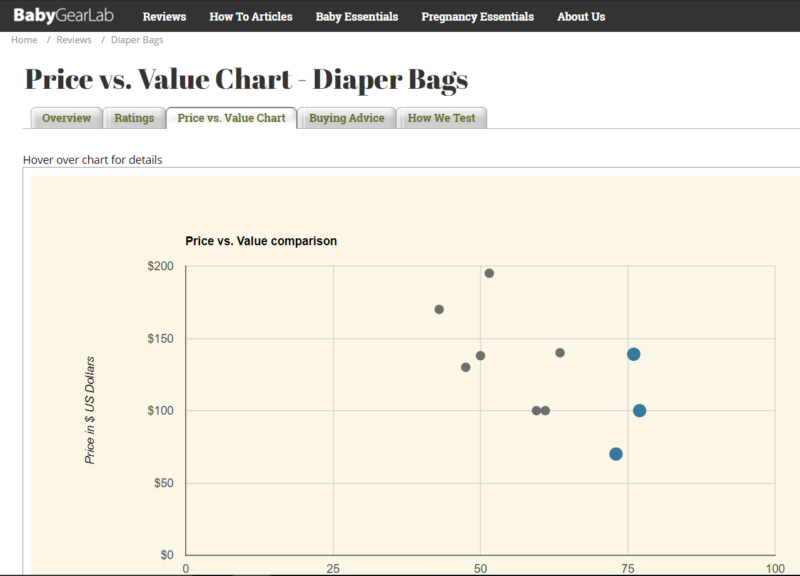
Successful websites are built on popular, useful pages that attract and delight new visitors. These pages capture valuable traffic by serving a specific purpose or need.
However, these pages don’t happen by accident. Building useful pages requires research and strategic planning. You should be thinking about links and search opportunities during the ideation phase, before you start writing and designing new pages.
Page-level research should include:
- analyzing search volume for potential target terms.
- identifying SERPs with bad or weak results.
- examining ranking pages.
- scrutinizing competitor content and strategies.
I’m going to walk through this process of page-level keyword research, using a real site as an example. Follow along and learn how you can leverage this process for your own SEO strategy.
Identify opportunities for improvement
The first step in page ideation should be identifying potential opportunities.
My wife and I recently welcomed our first child — a beautiful baby boy named Liam — to the world.

So in honor of this cute little guy, I’m going to explore the baby products niche with my example.
My example site for this process will be Lucie’s List, and I’ll work through the ideation process of creating a new hypothetical page for them.
Since I don’t have directives or priorities from Lucie’s List to work from, I’ll start by looking for opportunities where Lucie’s List could potentially rank better and capture more relevant traffic.
To do this, I’m going to examine the “Positions” tab in SEMrush and sort by volume to find high-volume terms where Lucie’s List is lacking visibility.
Examining the data in SEMrush reveals some potential opportunities, including:
- [diaper bag] — Position: 68; Volume: 33,100
- [rock n play] — Position: 64; Volume: 27,100
- [nursing tops] — Position: 75; Volume: 18,100
- [toddler rain boots] — Position: 96; Volume: 14,800
- [baby high chair] — Position: 86; Volume: 12,100
- [best diaper bags] — Position: 62; Volume: 12,100
- [baby onesies] — Position: 60; Volume: 12,100
- [rock n play sleeper] — Position: 69; Volume: 12,100
Now I have a solid base of high-volume terms where Lucie’s List has the opportunity for improvement.
Next, I’ll look at the current search results.
Examine top results
I’m searching for specific factors that will indicate I can create a page for Lucie’s List that will be competitive.
These indicators are:
- SERPs with a dearth of strong, recognizable brand names.
- bad exact-match domains ranking.
- listings with low-quality aesthetics and poor on-page content.
- pages with low-level link competition.
Analyzing the SERPs reveals that page 1 for many of these terms is dominated by large brands:

However, [best diaper bags] might be a possibility:

Although Amazon, Consumer Reports and Business Insider (???) are present, the majority of results here are smaller baby-centric sites.
There aren’t any exact-match domains or blatantly poor results, but scrutinizing the content of these pages reveals opportunity. Most are simply lists of diaper bags with little more than images, prices and affiliate links. For example, this page:

Or this slide show:

The Consumer Reports page is more of a resource but lacks any images, design or readability. Useful information is presented via large blocks of text, with no visual elements to break up that text:

Even with such helpful information, this isn’t a good result for someone quickly scanning for the best diaper bag options — it reads more like a novel than an online resource.
These aren’t terrible results, but I believe it would be possible to create a resource that readers (and Google) would prefer.
Scrutinize backlinks and traffic value
Finally, I’ll analyze the link competition for these pages.
The top result, from BabyList, has nine referring domains, according to Majestic:

Plugging the rest of the URLs into Majestic shows more promise for the potential to rank here:
- Amazon: seven referring domains
- Business Insider: five referring domains
- BabyCenter: four referring domains
- Momtastic: eight referring domains
- MomTricks: four referring domains
- Lauren Conrad: 10 referring domains
- The Bump: three referring domains
- POPSUGAR: six referring domains
- Consumer Reports: three referring domains
Of course, these pages are hosted on authoritative domains, which also plays a factor. However, Lucie’s List is also fairly authoritative, and the link numbers here aren’t too large to compete.
Put all this together with the fact that SEMrush shows the first result on this page has a traffic value of $14,000, and it’s worth it for Lucie’s List to build a new page or update their existing page targeting this term.

In fact, the page on Lucie’s List that’s ranking in position 62 for [best diaper bags] is actually a broader page that offers basic ideas for baby registries.
This reinforces the fact that there is an opportunity here for Lucie’s List, as they could likely rank much better if they built a dedicated page focusing only on diaper bags.
Now that I have a solid idea to work with, I’m going to investigate what Lucie’s List’s competitors have done with their pages.
Analyze competitor strategies
I have identified a potential opportunity for Lucie’s List to capture more traffic. But before I start creating content, I’ll want to check in on the competition.
According to SEMrush, Lucie’s List’s top competitors include:
- Babylist
- BabyGearLab
- Parent Guide
- Mommyhood101
- BuyBuy Baby
- MomTricks
I’ve already seen the strategies BabyList and MomTricks are using during my analysis of the SERP. Obviously, these pages shouldn’t be ignored, since they’re ranking on page 1, but I’m looking for more ways to improve on the model they use.
For example, BabyGearLab offers something slightly different on their page (ranking on page 2).

BabyGearLab built a scoring system, based on criteria such as storage space and comfort, and assigned scores to 10 different diaper bags. This is a great idea that could serve the needs of searchers well, but the execution could be improved.
For starters, Lucie’s List could improve on this idea by simply reviewing more bags — only listing 10 diaper bags doesn’t give consumers many options. Also, the tabs underneath the title all have unique URLs.

These tabs include relevant and important information. Rather than separate them into subfolders, it would be more optimal from a user and SEO standpoint to simply include this content on the page.
For Lucie’s List, I could also create comparison charts such as this:

This chart idea could be taken a step further by making the charts interactive, so readers could manipulate what data is shown, making it easier to compare specific bags.
I already have a handful of solid directions I can take with my page for Lucie’s List, and that’s just from one competitor! Examining the other competitor strategies would provide even more insight into how to create something searchers want.
Page creation and execution
Through proper research, I have found an opportunity to build a new page that can drive site traffic — all that’s left is execution.
To review, here is the information I learned during my research, which will empower me to create an important page for Lucie’s List:
- Identify opportunities for improvement. Lucie’s List has multiple opportunities to create pages to rank higher for terms with large search volumes.
- Examine top results. The search results for [best diaper bags] are mediocre and feature few big brands.
- Scrutinize backlinks and traffic value. Link competition for [best diaper bags] is low, and traffic value is decent.
- Analyze competitor strategies. A score-based review system and interactive comparison charts could be differentiators for Lucie’s List’s page.
Using this information, I can build a page for Lucie’s List that is optimized for search to capitalize on the opportunity available to them.
Hopefully, you can leverage this process for your own content creation.
Additional resources
For more information on keyword research, I highly recommend checking out these resources:
Some opinions expressed in this article may be those of a guest author and not necessarily Search Engine Land. Staff authors are listed here.

